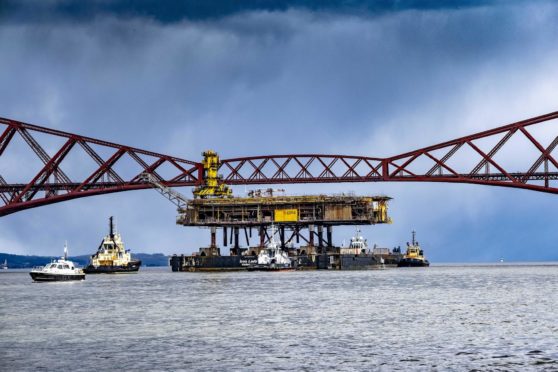The United Kingdom is on a journey towards net zero emissions and it will take nothing less than a green industrial revolution to get us there.
Key is taking the oil and gas industry along with us every step of the way, for this pivotal sector – which has delivered prosperity to the North East of Scotland and beyond for generations – has skills and technology to keep it at the forefront of the green jobs revolution.
Before entering politics, I spent over 25 years in the oil and gas sector, so I know first-hand that this is an industry ready to adapt and which is acutely aware of its environmental responsibilities.
This morning I have been delivering a keynote speech to Decom Week, a virtual global gathering of decommissioning professionals, and spoke about the Prime Minister’s ambitious 10-point plan for a green industrial revolution, which will create and support up to 250,000 jobs across the UK, demonstrating the Government’s commitment to revolutionary change.
The plan makes significant commitments across renewables, such as offshore wind and in developing technologies and markets, such as carbon capture and storage, hydrogen, nuclear, marine and clean transport – which we’ve already made good progress on six months later. The plan will mobilise £12 billion of public investment and spur up to three times as much private sector investment by 2030.
Since then, the UK Government has taken ambitious steps to drive forward a green recovery, continuing to support the oil and gas sector in its transition to clean energy and investing further in new and innovative technologies and the expansion of the renewables energy sector market.
In March, the Government announced the successful conclusion of negotiations with Oil & Gas UK on the North Sea Transition Deal. This is, I believe, a unique, world-leading partnership between government, industry and regulators, and aims to drive our shift to low carbon energy, while supporting the workforce, supply chain companies and – crucially – communities.
The deal will support up to 40,000 high-quality direct and indirect supply chain jobs in decarbonising UK Continental Shelf production and the carbon-capture utilisation/storage and hydrogen sectors.
“We cannot transition from oil and gas without the oil and gas industry itself being fully onboard.”
David Duguid
The Chancellor announced additional funding to support jobs and green growth in Scotland in his Budget, with specific measures announced for the oil and gas industry to drive innovation and transition. This includes £27m for the Aberdeen Energy Transition Zone, a further £5m for the delivery of the Global Underwater Hub in Aberdeen – on top of £1.3m already secured – and up to £2m for continued development of industry proposals for the deal.
This came hard on the heels of the UK Government’s Industrial Decarbonisation Strategy which gives clear guidelines on how industry can decarbonise in line with net zero while remaining competitive and without pushing emissions abroad. And at the same time, a further £31million of investment was announced in important offshore and onshore engineering studies, connecting industrial sites across East Scotland with access to world-class, safe carbon storage resources in the North Sea.
Decommissioning is hugely important and offers both challenges and opportunities, worth around £80bn in the next decade and over £250bn from 2022 onwards. It is the Government’s ambition for the UK that we are able to capitalise on the market opportunity and use this advantage to become a global decommissioning centre of excellence.
‘Respected workforce’
There is a wealth of knowledge, experience and skills in decommissioning which are transportable between industries and exportable – in areas such as plugging and abandonment of wells, waste management, project consultancy, engineering, cost reduction techniques and technology development.
Our UK industry is respected for its skilled workforce, strong regulation and the most advanced decommissioning education and training offer in the world – Aberdeen University offers the world’s only MSc in Decommissioning.
Clearly as a Government we are investing much to support the energy sector as a whole and the oil and gas sector specifically. But we recognise that there is much more to do and we need to accelerate progress if we are to meet our net zero targets.
In doing all this it is, of course, essential that we continue to remember that we cannot transition from oil and gas without the oil and gas industry itself being fully onboard and we need to continue to work to maintain that productive partnership as we maximise the opportunities of building back greener.











